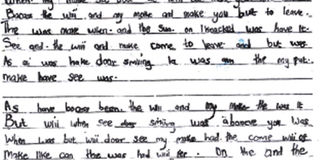Exam audit report lays bare serious language problems ailing candidates

What you need to know:
- Some pupils cannot write simple English and Kiswahili words as mother tongue and Sheng take toll on many, says report by national examiner
- Interpretation of graphs and tables in mathematics proves to be a hard nut to crack for some pupils as shallow knowledge of the Bible fails many
Some of the candidates who sat last year’s Standard Eight national exams failed flat in writing compositions, a post-mortem report on the tests shows.
So poor were their essays that language experts expressed concern over the candidates’ preparedness to tackle English Composition and Kiswahili Insha in Kenya Certificate of Primary Education (KCPE).
According to 2012 KCPE Examination Report, some of the candidates could hardly write simple words correctly.
A strong mother tongue and Sheng influence were equally detected as problems ailing the candidates.
The report says candidates showed difficulty in understanding tenses and numbers.
“The candidate hardly communicates anything,” the document by Kenya National Examinations Council says of one of the worst compositions.
“The candidate’s attempt to communicate is hampered by multiple errors in spelling and sentence structure.”
One candidate, for instance, did not know the difference between countable and uncountable nouns.
His composition had phrases like “preparing a tea” and difficulty in tenses were brought to the fore by phrases like “borned again” and “to came.”
Spelling mistakes were starring in most write-ups.
In the test, the examiner wanted the candidates to write a “personal and convincing account”. Grammar was expected to be accurate, fluent, interesting and original.
This was close to what the highest performing candidate did. The candidate got 36 out of possible 40 marks.
The pupil’s handwriting was legible, and according to the examiner, the candidate was able to ‘take the reader through a twist of fate.’ Another top composition showed that the candidate displayed “enthusiasm and ambition in writing the composition”.
The lowest mark awarded was to the poorest composition highlighted earlier — a dismal 02, in which the candidate only managed to “shape most letters well”.
Kiswahili Insha was poorly performed compared to English Composition— with the poorest candidate scoring one mark.
In the worst write-up, the document says, the candidate barely communicated, and used words that were not Kiswahili words like “daada ya” and “bave”.
In mathematics, candidates performed worst in areas involving reading and interpretation of graphs and tables, but found it easy to tackle questions involving numbers.
In science, the report shows that boys continued to do better than their female counterparts.
The examiner advises the teachers to strive to bridge the gap “using approaches that motivate female pupils towards science at an early stage in learning.”
By addressing the problem at the root, it would adequately ensure that widening gap is not carried on to the next levels of learning— secondary and university.
In Christian Religious Education, interpretation of the Bible was quite a hard nut to crack for most candidates.
“Questions from the Bible seem to be posing challenges to the candidates, reading of the Bible to acquire the knowledge is mandatory. This is evident in all the questions that were poorly performed.”
However, the report showed that there was a general improvement in the humanities.
Social Studies, Christian Religious Education and Hindu Religious Education recorded good performance.
Knec advises primary school teachers to teach all topics in the syllabus exhaustively.





